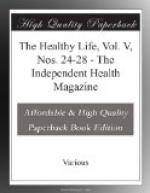that she feared she would find no arguments fit to
oppose to theirs. Weakly, she locked the skeleton
cupboard. Then she was attacked by a malady
which, while leaving her mind free and strong, she
knew might be very speedily fatal. Straightway
she said to her husband: “In two or three
days I shall probably ’know’—or
cease from all knowing. There will not be long
to wait. Therefore bring me three books,”
which she named, works of authors of extreme agnostic
views. Rather reluctantly he complied with her
wish. She went steadily through the joyless
pages, turned the last with the significant remark:
“If this is all they can say, well!—”
The skeleton cupboard, once opened, was speedily
swept out. She quickly recovered, but never
forgot her experience. Yet it must be remembered
that this was the patient’s own prescription,
and was permitted by one who thoroughly understood
her temperament. Therefore, though one would
never wish to overrule a strong personal desire, that
is quite different from offering counsel and furtherance—or
proving experiments upon oneself.
A celebrated woman writer of the middle of last century was of opinion that young people of both sexes should not indulge in reading “minor poetry.” “Let them keep to the great poets, made of granite,” was her graphic phrase. A woman of singularly self-controlled nature has confessed that the only time in her whole life that she experienced an unwholesome moral and emotional disturbance, after reading a book, was when, at about twenty-two years of age, she read Emily Bronte’s Wuthering Heights. She dared not finish it: and when, some time later, a copy was presented to her, she caused it to be exchanged for another book, not wishing it even to be in the house with her. Years afterwards, she read it again, quite unmoved. It may be added that her first reading was made in the course of a systematic study of English literature, which had already led her through the works of Chaucer and Fielding. She has herself asked: “Is it possible that the strong and unpleasant effect was produced because the book was the production of another young woman, perhaps of somewhat ‘sympathetic’ temperament?”
Taken as a whole, probably most fiction and all highly emotional work of any sort should be indulged in sparingly by those in the danger-zone of life, or by any under special mental or moral stress. History, philosophy (with sustained chains of reasoning) and biographies (best, autobiographies) of active and strenuous lives, should be resorted to by those temporarily doomed to spells of suspense and involuntary inaction. Invalids should be encouraged to read Plutarch’s Lives rather than the Memorials of other sufferers, however saintly!
It may be broadly stated that, during the tragic episodes which seem to occur in all lives, the most wholesome reading is to be found in the books of the great World-Religions—the Bible,




